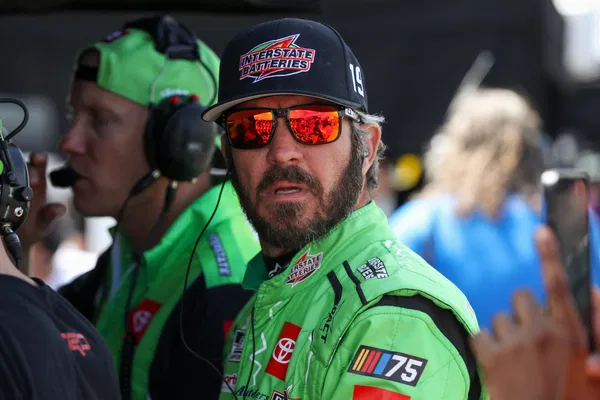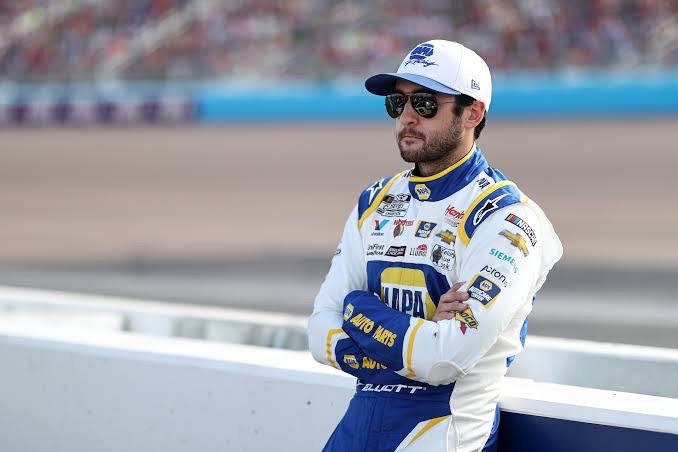Martin Truex Jr.’s hopes of keeping his NASCAR championship dreams alive at Bristol Motor Speedway took a dramatic downturn, despite the track being one where he had previously shined. Earlier in the season, he finished a strong second place behind his Joe Gibbs Racing teammate, Denny Hamlin, in a tough race known for its heavy tire wear. But this time around, his championship bid was derailed by a single costly mistake—speeding on pit road.
Everything seemed to be going according to plan for Truex Jr. as he collected valuable stage points and positioned himself well in the race. By the final stage, he was running in second place, seemingly on track for a top finish that would secure his advancement to the next playoff round. However, during lap 333, he was caught speeding while exiting the pit lane, going just 0.9 mph over the limit. This infraction resulted in a pass-through penalty, effectively ruining his chances of regaining his position. With no cautions in the remaining 163 laps, Truex Jr. found himself trapped in the middle of the pack, struggling to make up lost ground.
What was expected to be an exciting and pivotal race for Truex Jr. turned into a frustrating display of NASCAR’s ongoing challenges with the short-track package. There has been growing criticism of the Next-Gen car, especially regarding its performance on short tracks, where passing opportunities have significantly diminished. Despite multiple attempts to tweak the system, including using different tire compounds, nothing has fixed the issue. NASCAR had hoped that by introducing a new tire setup at Bristol earlier in the season, they’d finally cracked the code to improve racing on these tracks. Unfortunately, Sunday’s race only reaffirmed that the problem persists.
Journalist Jeff Gluck voiced his frustrations after the race, echoing the sentiments of many fans and drivers. On his podcast, *The Teardown*, Gluck highlighted how difficult it was for even top-tier drivers like Martin Truex Jr. to pass slower competitors, such as the cars from Kaulig Racing and Rick Ware Racing. This wasn’t an isolated incident either—Ty Gibbs, another talented driver, also struggled to move up through the field after an earlier setback. Gluck emphasized that NASCAR needs to take the issue seriously and cannot settle for the lackluster product currently seen on short tracks.
This issue isn’t confined to the Cup Series, either. The Xfinity Series race saw similar difficulties. Layne Riggs managed to pull off back-to-back wins, but other well-known drivers like Dale Earnhardt Jr. couldn’t find a way to advance. Earnhardt, in particular, fought hard but ultimately finished behind Ryan Truex in a lackluster battle for fifth place. These struggles indicate that the short-track dilemma is widespread and needs urgent attention from NASCAR.
Gluck wasn’t shy in his criticism, urging NASCAR to take bold steps in fixing the problem. He stressed that NASCAR cannot just accept the current state of short-track racing. The experimental tweaks with tire compounds and car packages haven’t delivered the exciting racing fans expect, and settling for this underwhelming performance would be a disservice to the sport.
For Martin Truex Jr., the fallout was devastating. After a strong season, it all came crashing down in Bristol. His disappointment was palpable as he took responsibility for the pit road error that effectively ended his playoff run. Truex had worked hard to erase a points deficit in the first two stages, collecting valuable points that kept him above the cutline. But the speeding penalty sealed his fate, and he could only manage to finish 24th. All he needed was a top-five finish to stay in contention, but instead, his dreams of a championship came to an abrupt end.
Truex was understandably upset after the race, acknowledging that the mistake was his own. “It’s on me, obviously. My mistake,” he said. He reflected on how close he and his team came to advancing, stating that while they might not have been able to win, it would have been nice to at least have the chance to try. Truex praised his team for their hard work and lamented the missed opportunity to see if they could have pulled off a miracle. “We had a really strong car tonight. We got a lot of stage points; we did what we needed to there. Just hate I screwed it up. I wish we could have at least seen if we could have done it. Would have been fun to have a fighting chance,” he added.
Truex wasn’t the only driver to face disappointment. Brad Keselowski, Ty Gibbs, and Harrison Burton also suffered setbacks that knocked them out of playoff contention. Despite the efforts of these talented drivers, NASCAR’s persistent issues with short-track racing continue to frustrate both competitors and fans alike. It remains to be seen whether the organization will take the necessary steps to address these problems or whether this will become the new normal for races on short tracks.
Insider Slams NASCAR’s ‘Unacceptable’ Short Track Performance That Derailed Martin Truex Jr’s Aspirations.




